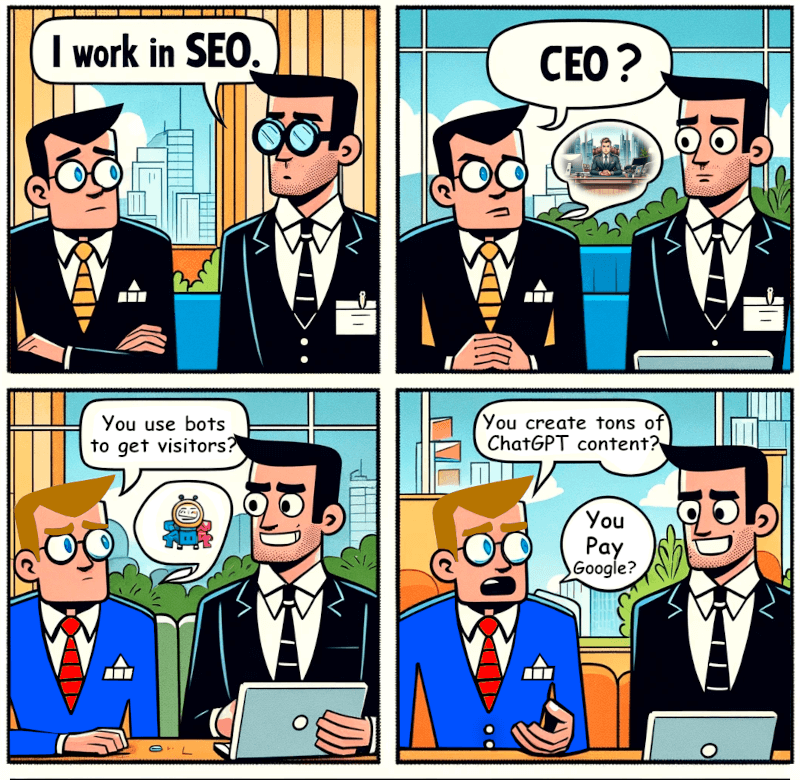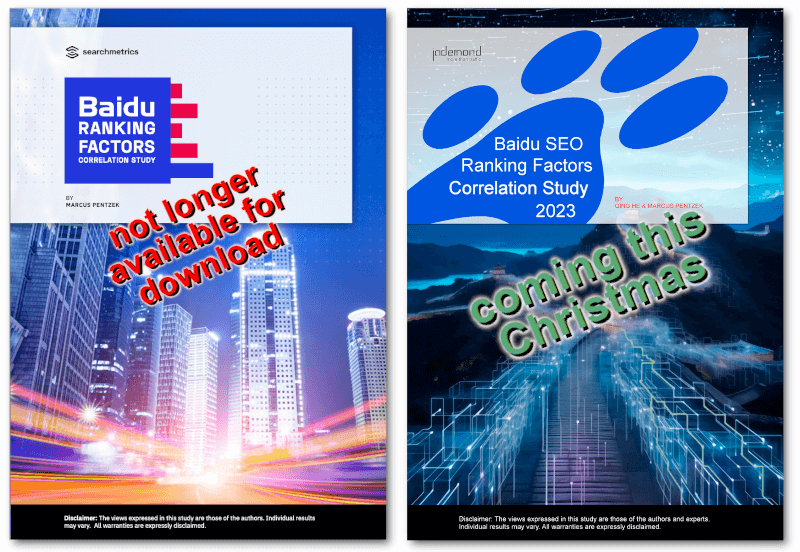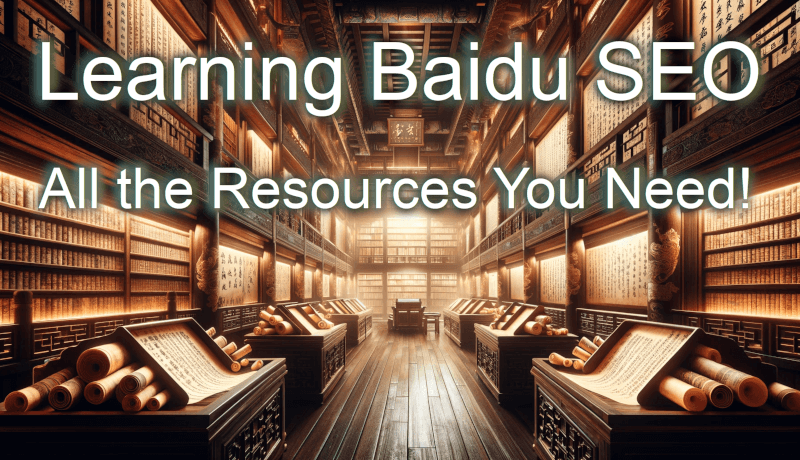When was the last time you tried explaining your job to someone and received a confused stare in return? For me, it was this week. Picture this: A casual conversation with another dad at school, a simple question floated—“What do you do for a living?”
“I work in SEO,” I responded instinctively, only to be met with a blank, puzzled look. It struck me then; I was speaking to someone outside of my professional bubble, someone unfamiliar with the jargons of my world.

To simplify, I elaborated, “I specialize in Search Engine Optimization. I assist clients in refining their websites so that search engines, like Baidu and Google, can understand the site’s relevance and ideally, rank it higher for user searches.” A nod of understanding, but his next assumption made me realize the depth of misconceptions surrounding my profession.
“So, you’re using bots to get your customers to the top, right?” he inferred, and it hit me; it’s crucial to demystify SEO for those who have little to no inkling about it. His concluding remark was the icing on the cake, “I once navigated the backend of a WordPress site; it already had this SEO installed.” Well, it seems we have a long, enlightening journey ahead!
Table of Contents
A Mission Unveiled
This encounter illuminated a mission for me—to pen down an article that unravels the essence of SEO for those who find themselves lost in its complexity. I’m embarking on this venture to break down SEO in the simplest terms, shatter myths, and offer insights without the intimidating jargons. So, if you’ve ever found yourself mystified by SEO, wondering what it truly entails, consider this your guiding light through the fog of misinformation. Let’s embark on this enlightening journey together, and by the end of it, the mist around SEO would hopefully be cleared!
Statement of Purpose
This article strives to clarify what SEO truly is and what it is not, specifically for those unfamiliar with the concept. We will peel back the layers of jargon and complexity to reveal the essence of SEO, shatter prevalent myths, and offer a clearer, simpler understanding. Our journey will be one of exploration and enlightenment, aimed at bringing clarity to those bewildered by the fog of misinformation surrounding SEO.
What is SEO?
When diving into the universe of SEO, it’s pivotal to start at the beginning, to understand its core essence before exploring its vastness. SEO, or Search Engine Optimization, might sound complex, but its essence is quite straightforward.
Definition of SEO:
Think of SEO as the art and science of making your website friendly to search engines like Google and Baidu. It’s like teaching your website a language that search engines understand. By optimizing various elements of your website, you help search engines comprehend what your site is about.
Goal of SEO:
The ultimate objective of SEO is fairly simple: to secure a higher spot in the search results when someone looks up topics you discuss on your site. Imagine a library; SEO helps your book (website) be the first one people see when they are looking for a certain topic. By doing so, it increases the likelihood of more people visiting your site, enhancing both the quantity and quality of visitors.
The Importance of SEO
SEO is more than just a strategy; it’s a cornerstone of effective online presence and brand recognition. In this section, we’ll explore the multifaceted nature of SEO, delving into its critical role in enhancing user experience, building trust and credibility, and ultimately shaping your brand’s visibility in the digital world.
Why is SEO Important? Beyond Just Visibility
SEO is vital for more than just making your website visible in search results; it’s about ensuring your brand is seen and recognized. This includes having your brand mentioned in articles on other websites, active engagement on social media, and coverage in press releases.
All these elements contribute to brand awareness and help in attracting new customers through organic search. SEO isn’t just about your website’s content being visible; it’s about your entire brand’s presence in the digital ecosystem. By effectively using SEO strategies, you can enhance your brand’s online visibility, reaching out to a wider audience and making a lasting impression.
User Experience: Enhancing Website Performance for SEO
A crucial aspect of SEO is optimizing the User Experience (UX). Search engines prioritize websites that provide a positive experience for users.
This means a well-designed, intuitive, and accessible website is more likely to rank higher in search results. Good UX involves a responsive design, fast loading times, and content that addresses the user’s needs and queries effectively.
By focusing on these elements, SEO not only makes your site more user-friendly but also aligns it with the factors search engines use to gauge a quality website.
Build Trust & Credibility: Establishing a Strong Online Presence
The trustworthiness and credibility of a website are essential for attracting and retaining visitors.
This trust can be built through various means, such as being recommended by credible resources, garnering positive client feedback on review platforms, employing SSL certificates for secure data transactions, and offering well-known payment and shipping methods, especially for e-commerce sites.
These elements contribute to a user’s trust in a website. Moreover, high-quality backlinks from reputable sources are a key indicator for search engines of a site’s credibility, influencing its ranking in search results.
SEO Is Not About Gaming the System
In understanding the essence of SEO, it is equally pivotal to discern what SEO is not, or more precisely, what it should not be. One prevailing misconception is the notion that SEO is about deploying bots or utilizing unscrupulous tactics to ‘trick’ search engines into ranking a website higher. This couldn’t be farther from the truth.
Clarification on Common SEO-Misconceptions:
SEO is not a clandestine maneuver to deceive search engines into awarding undeserved visibility. It’s not about underhandedly catapulting a website to the top of the search results through manipulation and deceit. True SEO is about creating value, enhancing user experience, and ensuring websites are optimized in line with the guidelines provided by search engines.

White Hat SEO vs. Black Hat SEO:
In the SEO world, practices are generally categorized into two: ‘White Hat SEO’ and ‘Black Hat SEO.’
- White Hat SEO: These are the ethical, approved strategies and techniques aimed at improving a website’s visibility. White Hat SEO adheres strictly to search engine guidelines and focuses on providing value to users, optimizing for humans rather than search engines. It involves creating quality content, improving user experience, and making websites more accessible.
- Black Hat SEO: Contrarily, Black Hat SEO refers to the unethical, frowned-upon practices that attempt to improve website rankings through deceptive means, often violating search engine guidelines. Examples include keyword stuffing, cloaking, and using hidden text. While these might offer temporary gains, they risk severe penalties, including being de-indexed by search engines.
Ethical Practices and Adherence to Search Engine Guidelines:
Ethical SEO is about playing by the rules, focusing on quality and value. It is about optimizing websites so that they offer better user experiences and more relevant content. Compliance with search engine guidelines is crucial. It involves being transparent, focusing on user value, and avoiding shortcuts and manipulations. True SEO professionals know the importance of maintaining integrity and prioritizing the user’s needs and experiences, working continuously to improve and adapt to the evolving landscape of the internet.
SEO should be approached with an understanding of its true purpose and a commitment to ethical, user-focused strategies. By adhering to these principles, not only do websites stand to gain better visibility and more traffic, but users also benefit from a more valuable and pleasant online experience. SEO, when done right, is a win-win scenario for both websites and their visitors.
The Components of SEO
SEO can be broken down into distinct components, each playing a crucial role in enhancing your website’s visibility and ranking. Let’s dive into these components and understand how they contribute to a successful SEO strategy.
1. Technical SEO: Optimizing Website Infrastructure
Technical SEO involves optimizing your website and servers to aid search engine spiders in crawling and indexing your site more effectively. This includes aspects like website speed, mobile-friendliness, structured data, and site architecture. Ensuring that search engines can easily navigate and understand your site is the foundational step in SEO.
2. On-Page SEO: Fine-Tuning Individual Pages
On-Page SEO focuses on optimizing individual pages on your website. This encompasses both the content and the HTML source code. Key elements include:
- Content Quality and Relevance: Ensuring that the content is informative, relevant, and provides value to the reader.
- Html Structure and Tag-Optimization: Making certain that search engine bots understand the structure and hierarchy of content on a page, distinguishing between main and secondary topics.
3. Off-Page SEO: Building Authority Beyond Your Site
Off-Page SEO involves activities taken outside of your own website to impact your rankings within search engine result pages. This typically includes:
- Backlinks: Acquiring quality backlinks from other websites. These serve as a vote of confidence from one site to another, contributing to your site’s “Authority,” which is crucial for ranking higher in search results.
- Content-Placements: Strategically placing content on external platforms like Quora, Wikipedia, or niche forums. This not only can result in backlinks but also increases brand visibility and recognition, especially if your content ranks well on these platforms.
Strategic Order of Implementation
The implementation order of these components is vital. Start with Technical SEO to ensure search engine bots can access and thoroughly crawl your website. Then move to On-Page SEO to ensure the right content is in place and is understandable to both bots and users. Finally, focus on Off-Page SEO to build authority and enhance your site’s ranking potential. In cases where your site is still building authority, leveraging Off-Page SEO on platforms like Quora or Wikipedia can be an effective way to gain visibility.
SEO Myths & Misconceptions
In SEO, a myriad of myths and misconceptions often lead to widespread pitfalls and ineffective strategies. This section aims to debunk some of the most common fallacies, illuminating the true nature of SEO and steering you towards more successful and knowledgeable approaches – just in very short bullet points:
- Myth: SEO Is a One-Time Effort
- Clarify that SEO is an ongoing process, not a set-it-and-forget-it task. Continual updates, content creation, and strategy adjustments are necessary due to evolving search engine algorithms and competitive landscapes.
- Misconception: Keyword Stuffing Boosts Rankings
- Discuss how overusing keywords (keyword stuffing) can actually harm SEO. Emphasize the importance of natural language and high-quality content.
- Myth: More Links, Better SEO
- Address the misconception that accumulating a large number of backlinks is always beneficial. Focus on the quality and relevance of backlinks rather than sheer quantity.
- Misconception: SEO Is All About Ranking #1
- Explain that while securing the top spot is beneficial, it’s not the only goal of SEO. Highlight the importance of overall visibility, user experience, and conversion rates.
- Myth: SEO Doesn’t Apply to Mobile
- Dispel the myth that SEO is only for desktop searches. Emphasize the growing importance of mobile optimization in SEO strategies.
- Misconception: Social Media Doesn’t Impact SEO
- Discuss the indirect effects of social media on SEO, such as brand visibility and content distribution, even though social media signals are not a direct ranking factor.
- Myth: SEO Is Just About Search Engines
- Reframe SEO as user-centric rather than just search engine-centric. Stress the importance of creating valuable content and a positive user experience.
- Misconception: Meta Tags Don’t Matter Anymore
- Explain the ongoing relevance of meta tags, particularly in terms of improving click-through rates and providing search engines with context about page content.
Conclusion:
In conclusion, understanding SEO is not just about grasping a set of technical tactics; it’s about recognizing its integral role in shaping your online presence and connecting with your audience effectively. As we’ve explored, SEO encompasses a range of strategies, from enhancing user experience to building a trustworthy digital footprint, all rooted in the principles of authenticity and value.
If you find yourself navigating the complex waters of SEO and seek guidance to implement ethical, effective white hat SEO strategies, we’re here to help. Don’t hesitate to reach out to us for specialized SEO consulting. Send us a message, and let’s embark on a journey to elevate your website and brand to their fullest potential.
Do you need assistance on your China Marketing? Or would you just schedule a free call to discuss your options? No matter of SEO for China, Search Ads, Social Media or Chinese E-Commerce, just send us a message!
Recommended Articles:








